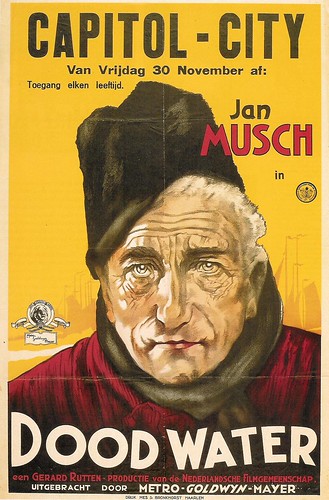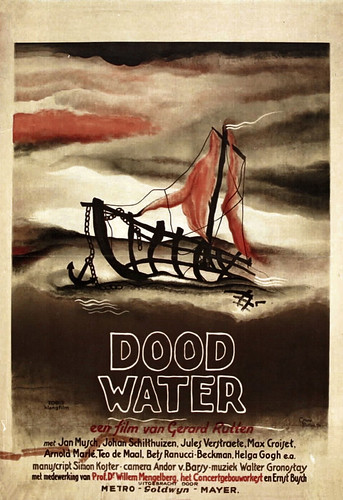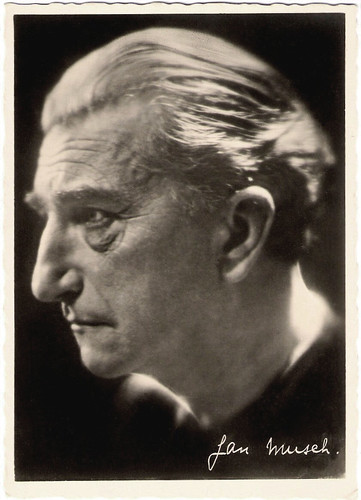Every year during the last week of September, Utrecht is the Dutch capital of film. This is the time of the Netherlands Film Festival (NFF), and traditionally EFSP organises its own Unofficial Netherlands Film Star Postcard Festival. Today we present one of the most remarkable Dutch films of the 1930s. Dood water/Dead Water (1934) re-enacts the historical closing of the Zuiderzee (Southern Sea) between 1927 and 1932. The award-winning drama was directed and co-written by Gerard Rutten and starred renowned Dutch stage actor Jan Musch as a doomed fisherman.

Dutch postcard, no. 38996. Photo: Nederlandse Filmgemeenschap, Holland. Publicity still for Dood water/Dead water (1934) with Max Croiset and Arnold Marlé. Collection: Geoffrey Donaldson Institute.
The social drama Dood water/Dead Water (Gerard Rutten, 1934) opens with a prologue about the Netherlands' everlasting battle against the sea and the history of the Afsluitdijk ('enclosure dam'). It's accompanied by music played by the Amsterdam Concertgebouworkest led by conductor Willem Mengelberg.
Dood water/Dead Water tells about a conflict between young and old fishermen in the little village of Volendam about the fishing in the Zuiderzee (the former Southern Sea, now IJsselmeer).
In 1927, the construction of the Afsluitdijk (the enclosure dam which made a lake of the Zuiderzee) was started. In Volendam, there is talk of 'dead water' and people realise that everything will not be like it was.
Fisherman Dirk Brak (Arnold Marlé) encourages his son Jan (Max Croiset) to become a farmer, but his brother-in-law, fisherman Willem de Geus (Jan Musch), wants radical action against the Afsluitdijk while his helper Jaap (Theo de Maal) recognises the opportunities that land reclamation brings.
Jaap becomes a civil servant, an act which makes him a traitor in the eyes of the villagers. Desperately, the old Willem de Geus tries to blow up the dam, but he dies during the explosion. The 30,000-meter-long Afsluitdijk was ready on 28 May 1932.

Dutch poster for Dood water/Dead Water (Gerard Rutten, 1934). Collection: EYE Filmmuseum.

Dutch poster for Dood water/Dead Water (Gerard Rutten, 1934). Design: Gerard Rutten. Collection: EYE Filmmuseum.
Dood water/Dead Water was largely shot on location, using natural light. The cameraman was Andor von Barsy, a respected Hungarian-Austrian cinematographer who’d already been successful in the Netherlands with short avant-garde films such as Hoogstraat/High Street (Andor von Barsy, 1929) about a Rotterdam shopping street.
At the second edition of the Venice Film Festival (Mostra Internazionale d'Arte Cinematografica) in 1934, the film won a Golden Lion for Best Cinematography.
Dood water received favourable reviews in the Italian press, and later also in the Netherlands. There was a German spoken version. Totes Wasser, the only Dutch feature film from the 1930s that reached the German cinemas. The film was very well received in Germany. Goebbels reportedly used Totes Wasser as a compulsory teaching material for German film students.
Important for the artistic success of the film was the photography by Andor von Barsy and the soundtrack. German artist Ernst Busch, who was very popular in The Netherlands at the time, sang an impressive Dutch version of the song 'Solidaritätslied' (Solidarity Song), composed by Walter Gronostay and conducted by Willem Mengelberg, during the documentary prologue of the film.
Writing for the British The Spectator, Graham Greene praised this prologue as "an exciting piece of pure cinema", and commented that the story which follows "has some of the magnificent drive one felt behind the classic Russian films, behind Earth and The General Line: no tiresome 'message', but a belief in the importance of a human activity truthfully reported". Greene also noted, however, that "the photography is uneven: at moments it is painfully 'arty', deliberately out of focus". MGM distributed the low-budget production internationally. However, the film was not a commercial success.

Jan Musch. Dutch postcard by REB in the series Portrettengalerij, no. 105.
The leading actor of Dood water, Jan Musch (1875-1960), was one of the great stars of the Dutch theatre during the first decades of the 20th Century.
In the 1930s, he starred in a few Dutch films, including De Man zonder hart/The Man Without a Heart (Leo Joannon, 1937), and the thriller De spooktrein/The Ghost Train (Carl Lamac, 1939) with Fien de la Mar.
After the war, Gerard Rutten directed successful light entertainment films like Sterren stralen overal/Stars Twinkle Everywhere (Gerard Rutten, 1953), about a struggling taxi driver (Johan Kaart) who dreams of emigrating to Australia, and Het wonderlijke leven van Willem Parel/The Wondrous life of Willem Parel (Gerard Rutten, 1955) with comedian Wim Sonneveld who has enough of his most popular character, Willem Parel the organ grinder, and tries to get rid of him.
Less successful was his biopic De vliegende Hollander/The Flying Dutchman (Gerard Rutten, 1957), about the early life of Dutch aircraft manufacturer Anthony Fokker.
Gerard Rutten could only make one more film, Wederzijds (Gerard Rutten, 1963), a documentary about Queen Wilhelmina. He died in 1982 at the age of 79.

Dutch postcard, no. 38993. Photo: Nederlandse Filmgemeenschap, Holland. Publicity still for Dood water/Dead water (1934). Collection: Geoffrey Donaldson Institute.
Listen here to the song 'Solidaritätslied' as sung by Ernst Busch. Source: WillemMengelberg.nl.
Sources: Eye Film, Filmtotaal (Dutch), Movie Meter (Dutch), Wikipedia (Dutch and English) and IMDb.
This post was last updated on 10 November 2023.

Dutch postcard, no. 38996. Photo: Nederlandse Filmgemeenschap, Holland. Publicity still for Dood water/Dead water (1934) with Max Croiset and Arnold Marlé. Collection: Geoffrey Donaldson Institute.
Dead Water
The social drama Dood water/Dead Water (Gerard Rutten, 1934) opens with a prologue about the Netherlands' everlasting battle against the sea and the history of the Afsluitdijk ('enclosure dam'). It's accompanied by music played by the Amsterdam Concertgebouworkest led by conductor Willem Mengelberg.
Dood water/Dead Water tells about a conflict between young and old fishermen in the little village of Volendam about the fishing in the Zuiderzee (the former Southern Sea, now IJsselmeer).
In 1927, the construction of the Afsluitdijk (the enclosure dam which made a lake of the Zuiderzee) was started. In Volendam, there is talk of 'dead water' and people realise that everything will not be like it was.
Fisherman Dirk Brak (Arnold Marlé) encourages his son Jan (Max Croiset) to become a farmer, but his brother-in-law, fisherman Willem de Geus (Jan Musch), wants radical action against the Afsluitdijk while his helper Jaap (Theo de Maal) recognises the opportunities that land reclamation brings.
Jaap becomes a civil servant, an act which makes him a traitor in the eyes of the villagers. Desperately, the old Willem de Geus tries to blow up the dam, but he dies during the explosion. The 30,000-meter-long Afsluitdijk was ready on 28 May 1932.

Dutch poster for Dood water/Dead Water (Gerard Rutten, 1934). Collection: EYE Filmmuseum.

Dutch poster for Dood water/Dead Water (Gerard Rutten, 1934). Design: Gerard Rutten. Collection: EYE Filmmuseum.
Golden Lion
Dood water/Dead Water was largely shot on location, using natural light. The cameraman was Andor von Barsy, a respected Hungarian-Austrian cinematographer who’d already been successful in the Netherlands with short avant-garde films such as Hoogstraat/High Street (Andor von Barsy, 1929) about a Rotterdam shopping street.
At the second edition of the Venice Film Festival (Mostra Internazionale d'Arte Cinematografica) in 1934, the film won a Golden Lion for Best Cinematography.
Dood water received favourable reviews in the Italian press, and later also in the Netherlands. There was a German spoken version. Totes Wasser, the only Dutch feature film from the 1930s that reached the German cinemas. The film was very well received in Germany. Goebbels reportedly used Totes Wasser as a compulsory teaching material for German film students.
Important for the artistic success of the film was the photography by Andor von Barsy and the soundtrack. German artist Ernst Busch, who was very popular in The Netherlands at the time, sang an impressive Dutch version of the song 'Solidaritätslied' (Solidarity Song), composed by Walter Gronostay and conducted by Willem Mengelberg, during the documentary prologue of the film.
Writing for the British The Spectator, Graham Greene praised this prologue as "an exciting piece of pure cinema", and commented that the story which follows "has some of the magnificent drive one felt behind the classic Russian films, behind Earth and The General Line: no tiresome 'message', but a belief in the importance of a human activity truthfully reported". Greene also noted, however, that "the photography is uneven: at moments it is painfully 'arty', deliberately out of focus". MGM distributed the low-budget production internationally. However, the film was not a commercial success.

Jan Musch. Dutch postcard by REB in the series Portrettengalerij, no. 105.
One of the great stars
The leading actor of Dood water, Jan Musch (1875-1960), was one of the great stars of the Dutch theatre during the first decades of the 20th Century.
In the 1930s, he starred in a few Dutch films, including De Man zonder hart/The Man Without a Heart (Leo Joannon, 1937), and the thriller De spooktrein/The Ghost Train (Carl Lamac, 1939) with Fien de la Mar.
After the war, Gerard Rutten directed successful light entertainment films like Sterren stralen overal/Stars Twinkle Everywhere (Gerard Rutten, 1953), about a struggling taxi driver (Johan Kaart) who dreams of emigrating to Australia, and Het wonderlijke leven van Willem Parel/The Wondrous life of Willem Parel (Gerard Rutten, 1955) with comedian Wim Sonneveld who has enough of his most popular character, Willem Parel the organ grinder, and tries to get rid of him.
Less successful was his biopic De vliegende Hollander/The Flying Dutchman (Gerard Rutten, 1957), about the early life of Dutch aircraft manufacturer Anthony Fokker.
Gerard Rutten could only make one more film, Wederzijds (Gerard Rutten, 1963), a documentary about Queen Wilhelmina. He died in 1982 at the age of 79.

Dutch postcard, no. 38993. Photo: Nederlandse Filmgemeenschap, Holland. Publicity still for Dood water/Dead water (1934). Collection: Geoffrey Donaldson Institute.
Listen here to the song 'Solidaritätslied' as sung by Ernst Busch. Source: WillemMengelberg.nl.
Sources: Eye Film, Filmtotaal (Dutch), Movie Meter (Dutch), Wikipedia (Dutch and English) and IMDb.
This post was last updated on 10 November 2023.
No comments:
Post a Comment